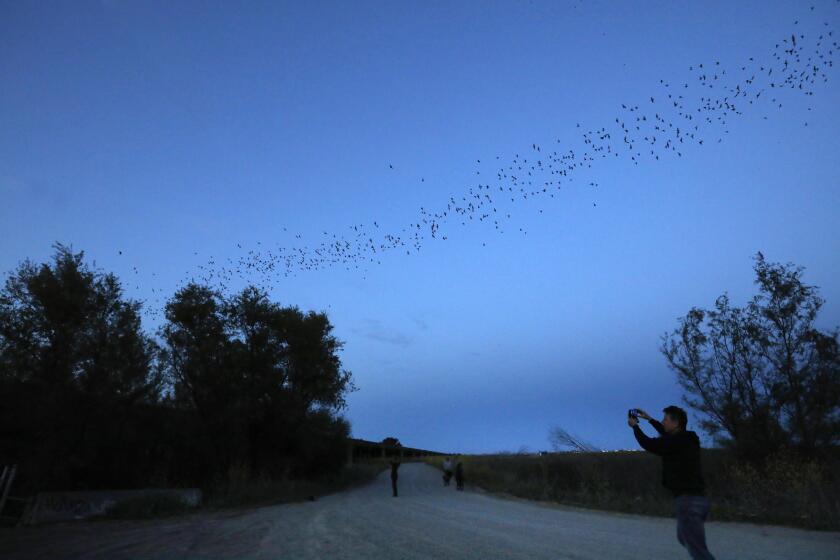City to Continue Legal Battle Against Pipeline
The Los Angeles City Council voted Tuesday to reject a franchise for an oil pipeline that would bisect the city, opting instead to continue a contentious legal battle against the $170-million project.
On a 10-2 vote, the council opposed construction of the 132-mile Pacific Pipeline that would travel from Kern County through parts of the San Fernando Valley to refineries in Wilmington, setting the stage for a courtroom decision to resolve the fate of the line.
If the franchise had been approved, the city would have been allowed to impose certain environmental conditions on the project. But if Pacific Pipeline wins the court battle, it would only be required to meet the minimal conditions imposed by the state.
As proposed, the pipeline would pump 130,000 barrels of heated crude oil per day through a 20-inch-diameter line that would travel through several of the city’s low-income, minority communities.
The California Public Utilities Commission gave Pacific Pipeline Systems Inc. the green light to build the line by ruling in April that the firm met the environmental requirements needed to build it.
But the council responded by filing two lawsuits to block construction, saying the state failed to study two alternative pipelines that already exist, one owned by Southern California Edison and the other by the Arco Corp.
For its part, Pacific Pipeline last month filed its own suit seeking to condemn city property along the route to allow construction to begin. Pacific has agreements to carry oil for Chevron and Texaco corporations.
A hearing on the condemnation request is scheduled for Oct. 17 in a Los Angeles Superior Court. Pacific Pipeline officials predict the legal battle could rage for months.
Pacific Pipeline System Inc. is owned by the Anschutz Corp., headed by Philip F. Anschutz, the Colorado billionaire businessman who is also co-owner of the Los Angeles Kings hockey team and is seeking to build a downtown arena.
Opponents of the line have repeatedly argued that the project increases the risk of a rupture and oil leak.
On Tuesday opponents pointed to Friday’s explosion of a gas line that was undergoing a pressure test in Echo Park. The explosion injured six people and ripped a 300-foot trench along Glendale Boulevard.
During the debate, Councilman Mike Hernandez, who represents communities in East Los Angeles where the line would travel, showed his colleagues four large photos of the damage caused by the Glendale Boulevard explosion.
“Let’s continue to stand up for the people of this city and not for the oil companies and the special interests,” he said.
Although Hernandez and other council members have accused Pacific Pipeline of “economic racism” for running the route through largely minority areas, several minority groups support the line because it would create 600 jobs.
Before the hearing, more than 70 members of minority groups, construction unions and churches held a news conference on the steps of City Hall to support the pipeline, saying the project would create much-needed jobs and reduce the need for trucks, trains and tankers that now haul oil.
“This is an absolute improvement on the current situation,” said Cynthia Valdez, who lives near the proposed pipeline route in the northeast Valley.
As proposed, the pipeline would travel along the Southern Pacific Railroad right of way parallel to the Golden State Freeway. Along the way, it would cut through the Valley, Burbank, Glendale, San Fernando and several communities in South Los Angeles.
The only votes in favor of the franchise came from Councilmen Hal Bernson and Rudy Svorinich Jr.
After the vote, Bernson said he doesn’t support the pipeline but fears the city may lose the legal battle and be forced to accept the pipeline without the city’s conditions.
“The implication is that we will not be able to negotiate some settlement,” he said.
Bernson also worried that the cost of the litigation could be high.
Jim Shamas, vice president for Pacific Pipeline, said he was confident the city would lose its legal challenge and the pipeline would be built.
He said if the courts side with Pacific Pipeline, the firm will not provide the 100 computer centers for schools along the line route, as has been offered under the franchise proposal.
“We think we are going to win in all the lawsuits,” he said.
But Councilman Richard Alarcon, a vocal opponent of the project who represents Valley communities where the line would travel, said he believes the city’s legal position is strong.
“The bottom line is that we are going to stand up for the safety of the community,” he said.
More to Read
Sign up for Essential California
The most important California stories and recommendations in your inbox every morning.
You may occasionally receive promotional content from the Los Angeles Times.










